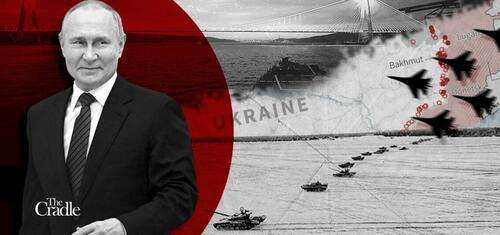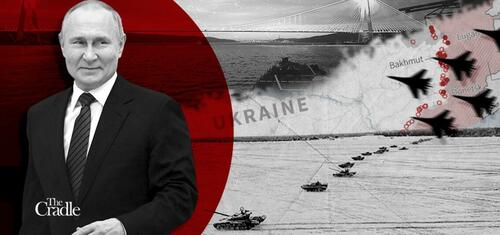Authored by Pepe Escobar via The Cradle,
In the Great Power competition, everything is connected: Uncertain negotiations between Russia and NATO over Ukraine may be impacted by Turkiye’s post-election pivot and Syria’s return to the Arab League…
West Asia is a region that is currently experiencing a great deal of geopolitical activity. Recent diplomatic efforts, initiated by Russia and overseen by China, secured a long-elusive Iranian and Saudi Arabian rapprochement, while Syria’s return to the Arab League has been welcomed with great fanfare. The diplomatic flurry signals a shift away from the Imperial “Divide and Rule” tactics that have been used for decades to create national, tribal, and sectarian rifts throughout this strategic region.
The proxy war in Syria, backed by the Empire and its terror outfits – including the occupation of resource-rich territories and mass theft of Syrian oil – continues to rage on despite Damascus having gained the upper hand. That advantage, weakened in recent years by a barrage of western economic killer sanctions, is now growing exponentially: the Syrian state was further bolstered by Iranian President Ebrahim Raisi’s recent official visit – pledging to expand bilateral ties – on the eve of Syria’s return to the Arab League.
“Assad must go” – a meme straight out of collective western hubris – in the end, did not go. Imperial threats notwithstanding, those Arab states that had sought to isolate the Syrian president came back to praise him all over again, led by Moscow and Tehran.
Syria is extensively discussed in informed circles in Moscow. There’s a sort of consensus that Russia, now concentrated in the “all or nothing” proxy war against NATO, will not currently be able to impose a Syrian peace solution, but that doesn’t preclude the Saudis, Iranians, and Turks fronting a Russian-led deal.
Had it not been for the aggressive behavior of Straussian neo-cons in the Washington Beltway, a comprehensive multi-territorial peace could have been achieved, including everything from Syria’s sovereignty, to a demilitarized zone in the Russian western borderlands, stability in the Caucasus, and a degree of respect for international law.
However, such a deal is unlikely to materialize, and instead, the situation in West Asia is likely to worsen. This is due in part to the fact that the North Atlantic has already shifted its focus to the South China Sea.
An impossible ‘peace’
The collective west appears to lack a decisive leader, with the Hegemon currently being “led” by a senile president who is remote-controlled by a pack of polished-faced warmongers. The situation has devolved to the point where the much-hyped “Ukrainian counter-offensive” may actually be the prelude to a NATO humiliation that will make Afghanistan look like Disneyland in the Hindu Kush.
Arguably there may be some similarities between Russia-NATO now and Turkiye-Russia before March 2020: both sides are betting on some crucial military breakthrough on the battlefield before sitting at the negotiating table. The US is desperate for it: even the 20th century ‘Oracle’ Henry Kissinger is now saying that with China involved, there will be negotiations before the end of 2023.
Despite the urgency of the situation, Moscow does not appear to be in a hurry. Its key military strategy, as seen in Bakhmut/Artemyovsk, is to use a combination of the snail technique and the mincing machine. The ultimate goal is to demilitarize NATO as a whole rather than just Ukraine, and so far, it appears to be working brilliantly.
Russia is in it for the long haul, anticipating that one day the collective west will have an “Eureka!” moment and realize it is time to abandon the race.
Now let’s assume, by some divine intervention, that negotiations would start in a few months, with China involved. Moscow – and Beijing – both know they simply cannot trust anything the Hegemon says or signs.
Moreover, the crucial US tactical victory has already been conclusive: Russia sanctioned, demonized and separated from Europe, and the EU cemented as a de-industrialized, inconsequential lowly vassal.
Presupposing there is a negotiated peace, it will arguably resemble a Syria 2.0, with a massive “Idlib” equivalent right on Russia’s door, which is something entirely unacceptable to Moscow.
In practice, we will have Banderista terror outfits – the Slav version of ISIS – free to roam across the Russian Federation in car bombing and kamikaze drone sprees. The Hegemon will be able to switch the proxy war on and off at will, just as it continues to do in Syria, Iraq, and Afghanistan with its terror cells.
The Security Council in Moscow knows very well, based on the Minsk farce acknowledged even by former German Chancellor Angela Merkel, that this will be Minsk on steroids: the Kiev regime, or rather the post-Zelensky regime will continue to be weaponized to death with brand new NATO gimmicks.
But then the other option – where there is nothing to negotiate – is equally ominous: a Forever War.
Indivisibility of Security
The real deal to be negotiated is not “pawn in their game” Ukraine: it’s the indivisibility of security. Exactly what Moscow was sensibly trying to convince Washington via those letters sent in December 2021.
In practice, what Moscow is currently doing is realpolitik: pounding NATO on the battlefield until they are weakened enough to accept a Strategic Military Operation (SMO). The SMO would necessarily include a demilitarized zone between NATO and Russia, a neutral Ukraine, and no nuclear weapons stationed in Poland, the Baltics, or Finland.
However, given that the Hegemon is a declining superpower and “non-agreement capable,” it is uncertain whether any of this would hold, especially considering the Hegemon’s obsession with infinite NATO expansion. “Non-agreement capable” (недоговороспособны), incidentally, is a term Russian diplomats coined to describe their American counterparts’ inability to stick to any deal they sign – from Minsk to the Iran nuclear agreement.
This incandescent mix gets even more complex with the introduction of the Turkish vector.
Turkish Foreign Minister Cavusoglu has already made it plain that if President Recep Tayyip Erdogan retains power in the 14 May presidential elections, Ankara will neither impose sanctions on Russia nor violate the Montreux Convention, which forbids the passage of warships to and from the Black Sea in wartime.
Risks of Ankara’s geopolitical shift
Erdogan’s chief security and foreign policy adviser, Ibrahim Kalyn, has aptly pointed out that there is no war between Russia and Ukraine; rather, it’s a war between Russia and the west with Ukraine serving as the proxy.
This is why the collective west is heavily invested in an “Erdogan must go” campaign, which is lavishly funded to propel an oddly-matched coalition into the presidential seat. In case the Turkish opposition wins – and their payment to the Hegemon begins – sanctions and violations of Montreux may be on the cards again.
Yet Washington may be in for a surprise. Turkish opposition leader Kemal Kilicdaroglu has implied there will be a more or less continued balanced posturing of Ankara’s foreign policy tilt, while some observers believe that even if Erdogan is ousted, there will be limits to Turkiye’s pivot back to the west.
Erdogan, profiting from the state apparatus and his immense network of patronage, is going no-holds-barred to secure re-election. Only then might he shift from hedging his bets continuously toward making a move to become a real player in Eurasian integration.
Ankara under Erdogan, as it stands, is not pro-Russian; essentially, it tries to profit from both sides. The Turks sell Bayraktar drones to Kiev, have clinched military deals, and at the same time, under the “Turkic States” mantle, invest in separatist tendencies in Crimea and in Kherson.
At the same time, Erdogan badly needs Russian military and energy cooperation. There are no illusions in Moscow about “the Sultan,” or about where Turkiye is leading. If Ankara’s geopolitical turn is hostile, it’s the Turks that will end up losing prime seats in the Eurasian high-speed train – from BRICS+ to the Shanghai Cooperation Organization (SCO) and all spaces in between.








